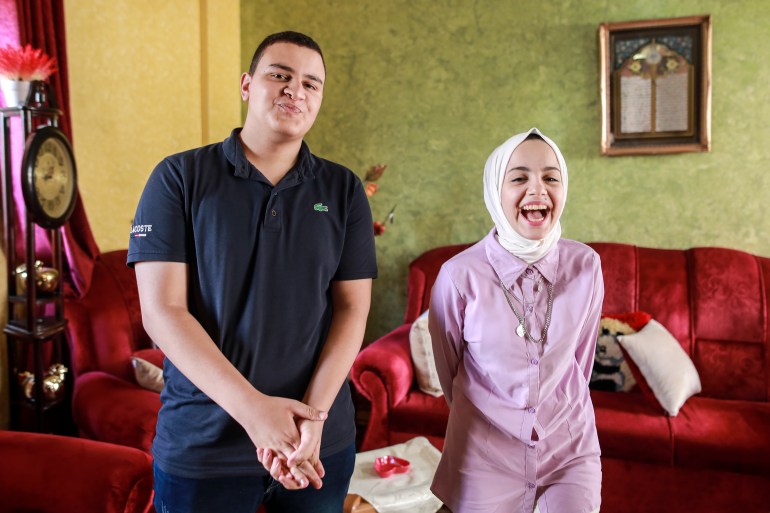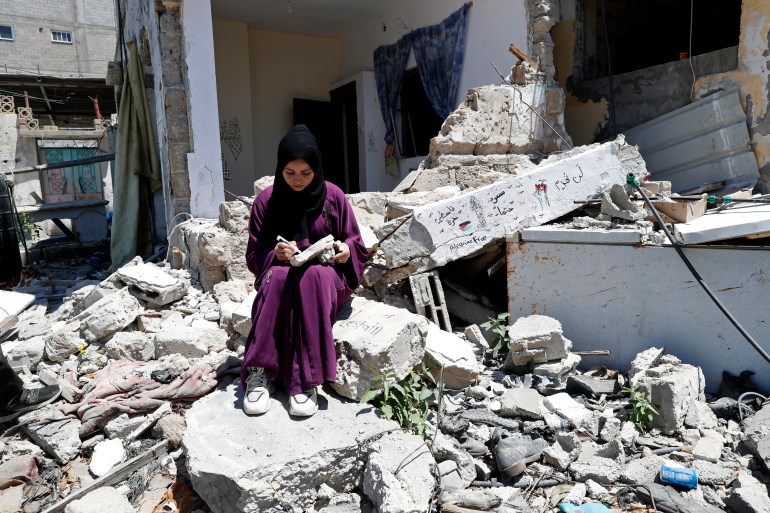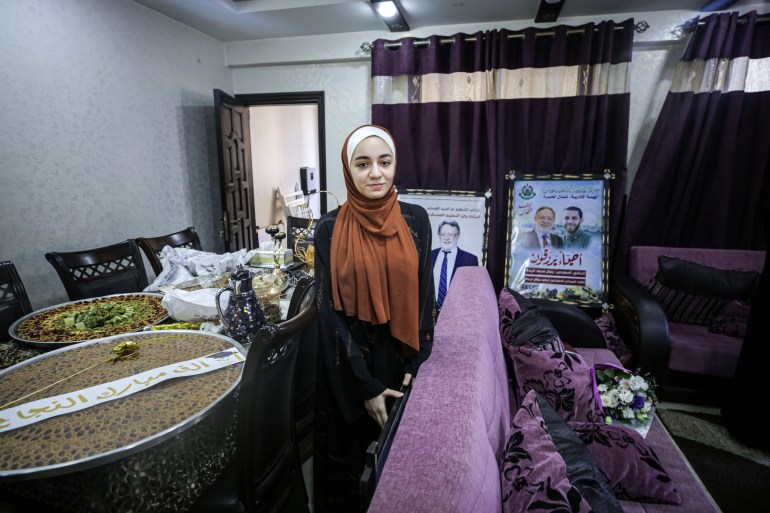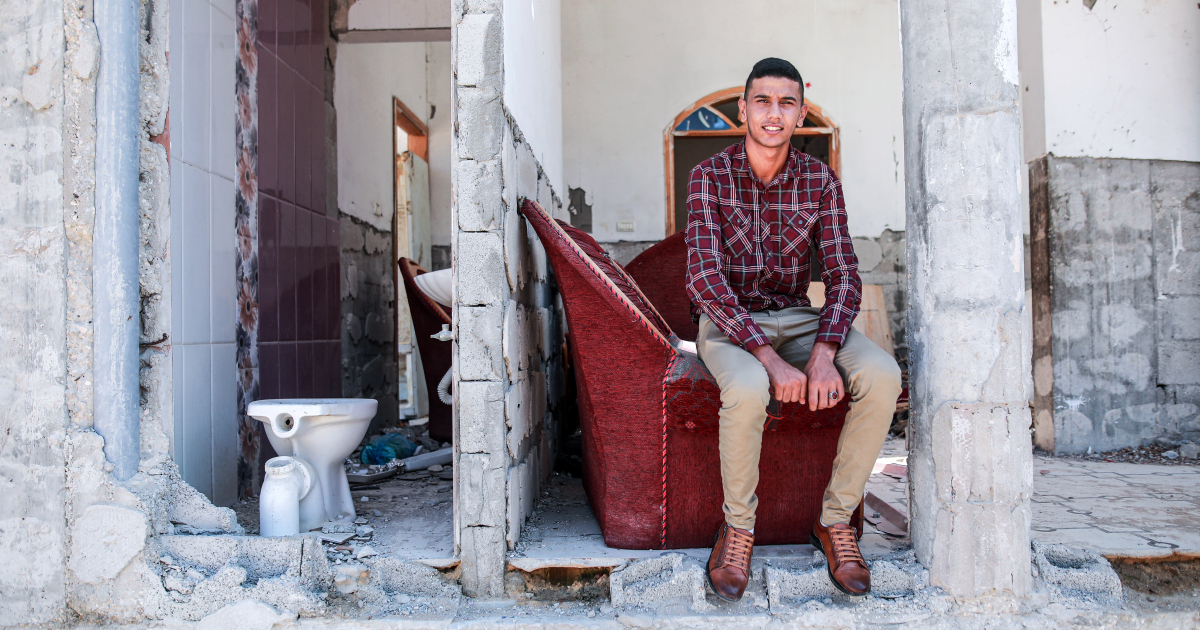Mona Zaqout sat in her living room in the besieged Gaza Strip with her eyes glued to her mobile phone. She was waiting to receive the results of her final school year examinations, known in the region as “Tawjihi”.
Beside her was her 18-year-old brother Ahmed, who is a year older and was also expecting his results. They were surrounded by family members who eagerly refreshed their phones and laptops to read out the outcomes.
As they trickled in, Ahmed’s appeared first. He had scored 98.4 percent, prompting loud cheers and applause from his relatives.
Moments later, Mona screamed in disbelief when her mother read out her score – a whopping 98.7 percent.
The pair could not believe they scored so well, given the circumstances they had endured in the months leading up to their final exams that began on June 24 and ended on July 12.
They sat through a series of tests only weeks after a deadly Israeli bombardment campaign ripped through the already ravaged Gaza Strip. The 11-day offensive, which began on May 10 and killed at least 260 Palestinians, including 66 children, was one of the most intense Israeli assaults on Gaza, and targeted a wide range of civilian structures.
On the Israeli side, 13 people were killed by rocket fire launched from the enclave by Palestinian groups.
 Ahmed and Mona could not believe they scored so well, given the circumstances they had endured in the months leading up to their final exams [Hosam Salem/Al Jazeera]
Ahmed and Mona could not believe they scored so well, given the circumstances they had endured in the months leading up to their final exams [Hosam Salem/Al Jazeera]Like thousands of others, Mona and Ahmed studied tirelessly, knowing that the results would determine the entire track of their higher education.
Students in the region typically prepare for these exams from the beginning of the academic year, but those Al Jazeera spoke to expressed how exceptionally hard it was given the obstacles they faced as Palestinians in particular.
Nearly 83,000 students sat this year’s exams across the occupied Palestinian territories, according to figures released by the education ministry, which put the pass percentage at 71.
At least four students were killed throughout the assault, while 70 others sustained injuries. They are scheduled to retake the exams at a later date, according to authorities in Gaza.
‘Maybe I wouldn’t die’
Citing school closures due to the coronavirus pandemic, rising tensions in occupied East Jerusalem, and the Israeli assault on Gaza which lasted from May 10 to 21, Mona and Ahmed described the months leading up to the exams as the “toughest to date”.
“The psychological pressure was unlike any other,” Mona told Al Jazeera. “During the 11-day war, every time I would hear the sound of an air strike, I would curl up and cry,” she said.
Days into the assault, the 17-year-old tried to “adjust to the situation” and come to terms with the sounds of falling missiles. She would attempt to study, but immediately forget everything she had been reading.
At the time, Ahmed felt just as helpless, describing the 11 days as a “nightmare”. For five consecutive days, he lived in utter fear and said he simply could not study. He later tried to read for two hours a day despite the continuous sound of explosions.
When asked what pushed him to study amid the offensive, Ahmed said, “I thought to myself: maybe I wouldn’t die, and in case I don’t I have to be prepared.”
 The 11-day offensive, which killed at least 260 Palestinians, including 66 children, was one of the most intense Israeli assaults on Gaza and targeted a wide range of civilian structures [File: Adel Hana/AP Photo]
The 11-day offensive, which killed at least 260 Palestinians, including 66 children, was one of the most intense Israeli assaults on Gaza and targeted a wide range of civilian structures [File: Adel Hana/AP Photo]Prior to the assault, students across the Strip were going to school just three times a week as part of a blended learning programme in place to curb the spread of the coronavirus. For the remainder of the two days, they would have to join classes virtually.
According to Gaza-based secondary school teacher Khaled al-Ailah, teaching remotely was among the most difficult challenges of this year.
“Much of the teachers are not trained to teach remotely, and many do not have access to electronics and computers,” the geography teacher said.
“And of course, the most obvious reason as to why this has been a challenging learning model is that many Palestinian families enduring poor living conditions do not even have access to the internet,” al-Ailah noted.
Despite the difficult times that Palestinians in Gaza have experienced collectively, teachers – who are often seen as guidance counsellors – have also had to maintain a strong and unaffected front when dealing with their students, he added.
‘Utterly devastated’
Those who pass the infamously difficult exams usually celebrate with fireworks, parties, and are showered with gifts and traditional sweets.
Sara al-Zebda’s home was flooded with kunafa – traditional Middle Eastern dessert – and flowers after scoring 95.3 percent. It was a dream come true, considering the young woman had lost her brother as well as her father in an Israeli air attack back in May.
“I was utterly devastated. I couldn’t study, I couldn’t do anything for weeks,” al-Zebda told Al Jazeera, describing the darkest moments of her life.
 It took Sara al-Zebda about a month after her father and brother died to realise she still needed to revise for the final exams [Hosam Salem/Al Jazeera)
It took Sara al-Zebda about a month after her father and brother died to realise she still needed to revise for the final exams [Hosam Salem/Al Jazeera)She recalled the day she last saw her father, and saw him leave the house knowing that there might be a chance he would not return.
“The sounds of the air strikes were on repeat … It wasn’t long till my family and I heard the news of their deaths,” al-Zebda, who had a particularly close relationship with her slain brother Usama, said.
“My brother Usama was the one who used to encourage me to be the best version of myself. He wasn’t just a brother – he was my best friend and my backbone,” she said.
It took al-Zebda about a month to realise she still needed to revise for the final exams. Reading through her notes, she recognised Usama’s handwriting from when he would help her study physics and maths.
“Seeing his handwriting and reading what he left me with really guided me when I was at my worst,” she said.
Others, like Ahmed Nusair, lost all of their study material during the offensive. His home was targeted on the eve of the Islamic holiday of Eid al-Fitr.
Wreckage and rubble have become a normal scene in Gaza, which has been under a crippling Israeli siege since 2007.
The attacks in May destroyed 2,000 residential units that are now unfit for housing, and partially destroyed at least another 22,000 housing units, forcing tens of thousands of Palestinians to take shelter elsewhere.
Some 74 public buildings, including local municipalities, were also destroyed, according to figures released by the information ministry run by Hamas, the group that rules the Gaza Strip.
 Ahmed Nusair had already missed a lot of classes when he was infected with COVID-19 earlier this year [Hosam Salem/Al Jazeera]
Ahmed Nusair had already missed a lot of classes when he was infected with COVID-19 earlier this year [Hosam Salem/Al Jazeera]“I remember the ceiling falling on us,” Nusair told Al Jazeera, recalling the moment his home was struck. “We all quickly scattered and started running but with nowhere to go.”
“Next thing I know we are at the hospital with my sister who sustained injuries,” he said. “We sought shelter throughout the 11 days of bombardment, and when they announced the truce, the first thing I thought of was: I need material to study for my final exams.”
Upon his return to his partially destroyed home, Nusair was hoping to salvage books, notepads, or “anything at all” to help him get through exams.
With just three weeks left until exams, “everything was gone”, he said, adding that he was pleased to have scored 66.4 percent.
He had already missed a lot of school time when he was infected with COVID-19 earlier this year, and later, when schools shut down because of the pandemic.
The health ministry eventually turned his school into a quarantine facility, and moved Nusair’s class to a different school with new administrators and teachers.
“We craved consistency and stability,” he said. “It was simply too disruptive for us as Tawjihi students.”
Additional reporting by Hosam Salem in Gaza.
